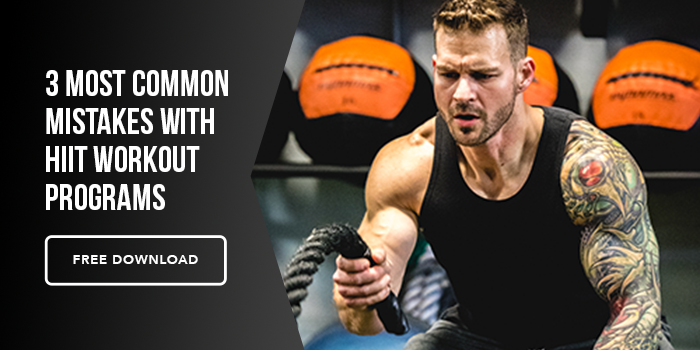HIIT workouts can be a hit (no pun intended) or miss. When programmed correctly, high-intensity interval training (HIIT) offers many benefits. It can be an excellent fat-burning tool, and it’s convenient for someone who is limited on time.
Along with other modes of training, HIIT is something that needs to be considered before jumping right into it. Take Olympic lifting—for some people, this can be a fun and challenging alternative to their typical lifting routine. However, you are not going to ask a 60-year-old to start doing barbell snatches, especially when they have never lifted weights before.
Essentially, you need to know your audience and what they are capable of, so they can stay injury-free. No matter what the success rate of a certain program is, it needs to be reasonably applied to the appropriate person.
With that said, HIIT workouts are not beneficial for everyone.
HIIT workouts, though short, are very taxing on the nervous system. The mistake a lot of people make is that they do too many HIIT workouts a week, which doesn’t allow enough time for the body to recover. We seem to forget that although a lot of work is happening in the gym, the magic happens during recovery periods.
Rest periods also allow cortisol levels to level off; cortisol naturally spikes during workouts, and they can remain that way post-workout as well. Unfortunately, a majority of society lives in a chronically stressful state, which keeps cortisol levels elevated. Cortisol isn’t inherently bad, but it can be when levels don’t decrease. Too much stress wreaks havoc on the nervous system, immune system, and overall health. How often do you get a good night’s sleep when you’re stressed? Not much, I’m sure.
If you’re someone who tends to get injured—I'm talking about pulled muscles and other acute injuries—HIIT is probably not for you. HIIT requires quick movements done repeatedly, so if form is off (even a little bit), then that could easily turn into an injury.
Even those with chronic injuries (back pain that won’t go away, tight joints, or a nagging knee problem) should probably steer clear of HIIT workouts, at least until whatever issues are occurring get resolved. Those aches and pains are your body telling you that something needs to be addressed. Your lower back may be bothering you because your hips are tight, and tight traps could be the result of faulty movement patterns in your shoulder girdle.
No one likes to deal with these things, but they should be looked at and handled, especially before over-exerting yourself with HIIT workouts.
Also, if you are wanting to get stronger and lift more weight, HIIT workouts are not for you. Some HIIT exercises require resistance, like with a kettlebell or dumbbell, but that doesn’t mean you are initiating a muscle-building response. HIIT is a form of cardio, not resistance training, which means the stress you are putting on your body is different from that of traditional weight training.
When compared to steady-state cardio, HIIT is more beneficial for hypertrophy and maintaining lean muscle tissue, but it’s not something I would choose if you want to lift heavier weights and gain more muscle. More muscle means more body mass, and people usually do HIIT workouts to lose mass.
To conclude, HIIT workouts are not for people who are already living in a chronically stressed state, are susceptible to injuries, or for those who want to get stronger.
Can they be beneficial for an otherwise healthy person who wants to change up their programming for a month or two with the goal of losing some fat? Absolutely. But again, truly evaluate whether HIIT will ultimately benefit you or steer you further away from reaching your goals.
A great way to get into HIIT training is with MAPS HIIT, a structured workout program that helps improve total fitness conditioning and provides fast results.






